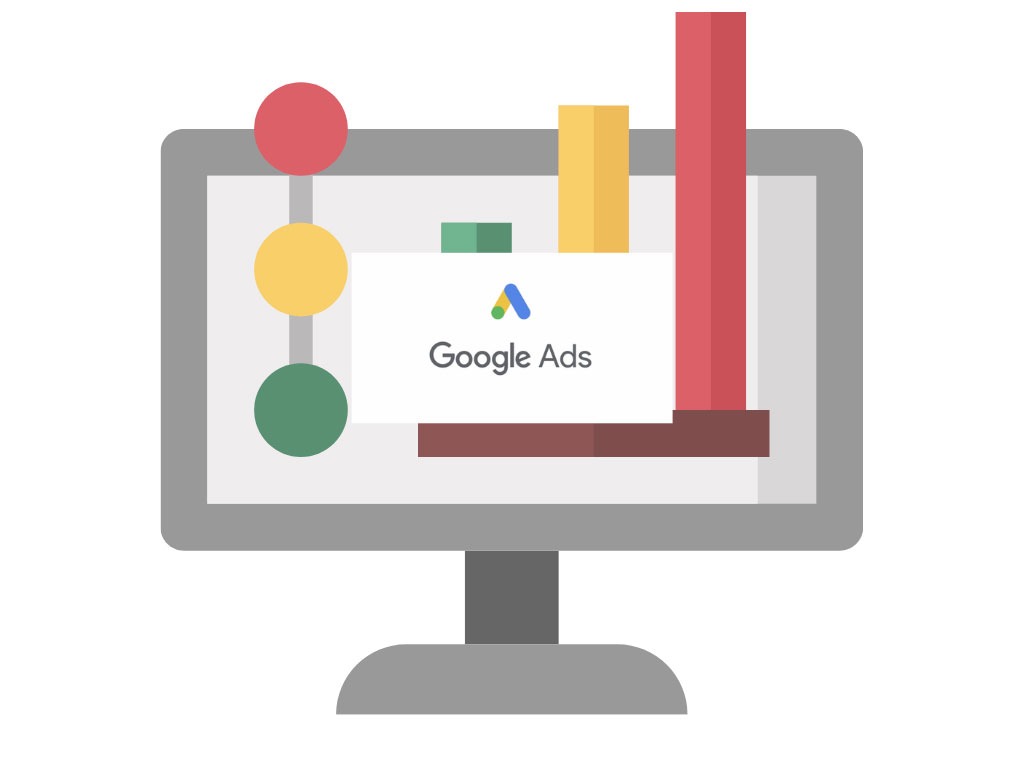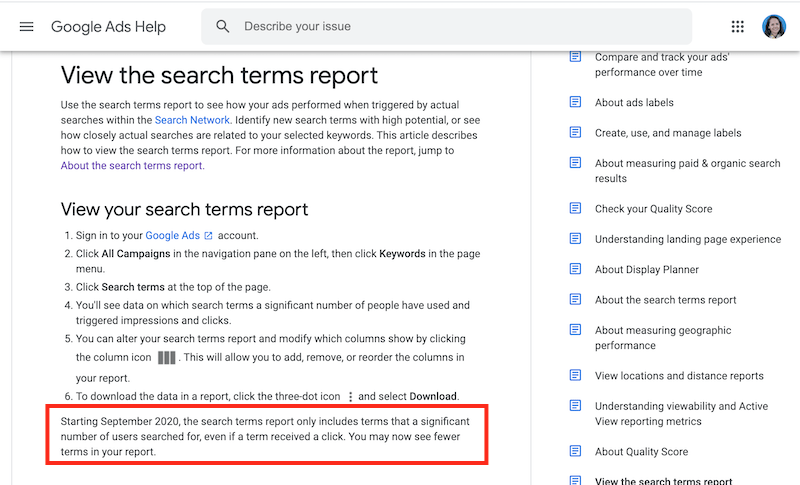Changes to the Search Terms Report in Google Ads
There is a big theme of privacy that dominates in the digital advertising space these days and many of the media partners we work with are adapting and changing their platforms because of this focus on privacy. Some of these changes are affecting information and tools that we have used to optimize campaigns. This blog covers changes like these to Google Ad’s search terms report.

In September 2020 Google announced a change in its search term report within Google Ads. This report is for keyword optimization by helping the campaign improve performance through the addition of negatives or targeting keywords based on popular user search queries. Because of this, the search terms report has been a key tool our team uses in the optimization of paid search campaigns.

A quick refresher on the search terms report
The search terms report is a feature within your Google Ads account that allows you to see exactly which search terms triggered your ads to appear, as well as how closely those terms relate to the keywords your ad is targeting.
If you have an ad targeting the keyword “farmhouse furniture” and someone searches for “farmhouse dining table,” the search term “farmhouse dining table” will appear in your search terms report, like you can see in the example below :

What’s Changing?
Advertisers have started being notified that the search terms report will be limited to terms that have significant searches and data only. In other words, the report will exclude terms that were not searched by a significant number of users. We don’t yet know what Google is defining as a ‘significant number of users’, and only time will provide clarity on what this means.
Advertisers are concerned about the decrease in visibility since search terms are so crucial to performance. Moreover, we’re concerned about what Google considers as a “significant amount of users”? Many pay-per-click specialists are worried that search terms with a single ad click won’t be accessible. Losing occasional data for one-click queries isn’t a big deal. The problem, however, is that one-click queries add up in cost. I’ve seen one-click queries account for 30 percent of an advertiser’s spend.
What Google is Saying on the Change
The purpose of this measure may be to prevent access to any personally identifiable information that users may include in their search queries. Of course user privacy makes sense and is very important, but the question is whether this is the most optimal solution, because there are thousands of low-volume queries with zero risk of privacy violations.
A Script to Calculate How Many Queries are Unidentified
We came across a script which can help calculate how much spend has gone to the unidentified queries.
The script pulls daily metrics for as many days back as you’d like. You can choose to focus on impressions, clicks, or cost. It pulls the data two ways:
- Using an account report, filtered for Ad Network Type = Search
- Using a search query report, also filtered for Ad Network Type = Search
It then compares the key metric, like cost, between the two reports. The account performance report should include data from all search queries, whereas the search query report now only includes data for search queries that made it past Google’s new filters.
For more information on the script and its usage, refer here.
Case Study
Let’s take a look at the change we’ve seen in one such campaign comparing the visibility of the search term report before and after the change got incorporated.
As you can see, there was a significant increase in budget spent on clicks on ‘unknown search terms’ after the change was made by Google in September.
How Advertisers Across the World Reacted to the Change
Almost immediately after this change was announced, a heated debate broke out in the PPC community, and social networks were flooded with mostly negative views on the change. PPC specialists are very disappointed with the limitations.
Here is a brief summary of the perspectives being shared:
- While this change has been announced by Google as a way to adhere to privacy thresholds, many advertisers see this as a strategic and self-seeking move on Google’s part.
- Google Ads should not restrict any data that advertisers use to optimize their campaigns.
- It hurts advertisers in competing industries that pay high costs for each click.
- If the primary concern is privacy, advertisers should be allowed to export all search terms along with statistics.
- The resulting shift to auto bidding, auto ads, and keyword-less bidding suggests Google is trying to give advertisers less control over their campaigns.
What Can PPC Specialists Do?
Unfortunately, there is not much to work around within Google Ads given the search terms update – at least not within your existing traditional search campaigns that are impacted by this change. PPC specialists cannot optimize for search terms that they cannot see. PPC specialists bidding on lower intent keywords may decide to drop these terms. Lower intent keywords help find positive and negative keywords, but they can also drive up costs. Without the full search terms visibility, it may make sense to bid solely on higher intent keywords. Here are some other options to consider, both within Google Ads and other platforms:
- Leverage Bing: PPC specialists who also run Bing Ads campaigns should make sure to run those search term reports. Both Google and Bing share similar search trends and your search campaigns will map out new search term opportunities in Bing. The report can provide the same information as Google, but Microsoft hasn’t shown any indication that it will be hiding queries. From Bing’s search query report, specialists might easily be able to find new keywords and negative keywords for Google as well.
- Try Dynamic Search Ads: We also suggest playing with Dynamic Search Ads to find new keywords: Dynamic search ads (DSA) can be very helpful in this scenario. DSAs are used to target ads based on the context of the landing page and can reach audiences for the search terms which might have been missed while creating keyword targeting because of this change to the search terms report. The search query report from a DSA campaign could help reveal gaps in the traditional campaign keyword coverage.
- Get Smart: Use of automated/Smart bidding strategies to optimize search campaigns is another option to consider. Smart bidding options like ‘maximize conversion’, tCPA (target cost per acquisition) etc., optimizes the campaigns that are closest to the conversion with the intention of maximizing the conversions or generating conversions at the desired CPA (cost per acquisition). Even though we can’t see all the search terms, Google’s machine learning will still be using it to optimize the campaign as a part of their automated bidding feature.
- Focus on the negative: PPC specialists might have to shift their approach from a positive keyword management strategy to a negative keyword management strategy for keyword optimization. While negating a single, low-volume keyword might have limited impact, in aggregate the costs on these low-volume keywords add up. Depending on how “significant” this change is, it may mean advertisers won’t be able to run an analysis on groups of lower-volume keywords to understand what words or phrases are working and which ones are not.
- Try Google Analytics: You might have luck at seeing search terms in Google Analytics – it turns out they are still appearing in Google Analytics Acquisition > Google Ads > Search Queries. Of course there’s no way for us to know if the ones that appear here are all of the queries. Unfortunately, the fact that they still appear in Google Analytics is likely an oversight that won’t be around for long. While Google Ads is hiding specific search queries in its interface, it appears to be doing so by setting clicks to 0 for them so that they don’t show up. However, the individual search terms are still being sent to Google Analytics without traffic figures via auto-tagging. Google Analytics is seeing these and assigning them their respective session data that it has. Now sessions won’t always equate to clicks for a number of reasons, however the figures should generally be close to your total click volume. As a result, you can still see every search term that brought traffic via Google Ads in the Google Analytics Search Query report. The ‘hidden’ ones are the search queries with 0 clicks and at least 1 session.
- Keep it clean: Finally, having well-structured accounts is more important than ever. Ensure that keywords are themed correctly by campaign and ad group. The targeted keywords should be in the ad copy with a clear call to action. These initiatives should be taken anyway, but they are critical with this update.
Reach out if you’d like to discuss your paid search campaign or opportunities with us today!